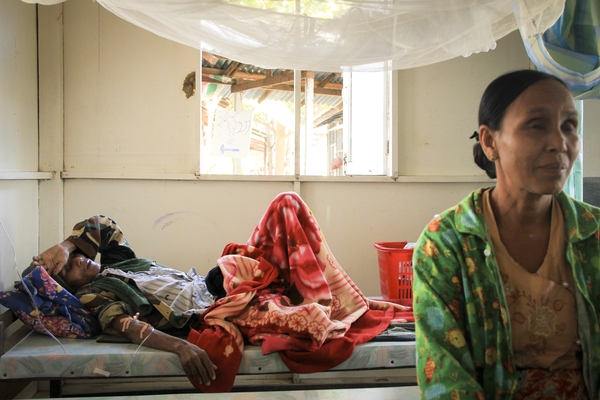“I would not have dreamt that this was possible last November,” said Peter Paul de Groote, head of mission for Médecins Sans Frontières (MSF) in Myanmar, referring to the Global Fund’s cancellation of funding that health workers in Myanmar were relying on to expand access to antiretrovirals (ARVs).
Instead, MSF has been forced to turn away people in need of ARVs. “It’s a trauma for patients sent away and for our staff,” said de Groote.
The Joint UN Programme on HIV/AIDS (UNAIDS) estimates 18,000 people die of AIDs-related illnesses annually in Myanmar.
The agency’s coordinator for Myanmar, Eamonn Murphy, said new funds will allow the country to close a “treatment gap” where only one-third of the 120,000 people nationwide who need ARVs receive them.
Health officials drafted a “concept note” outlining how additional funding might be used, which will be reviewed by the Global Fund’s board, Murphy said. It offers two scenarios: the first ensures 85 percent of those who need ARVs receive them by 2015; while with the second, 76 percent of people would be covered, he said. Based on feedback from the board, the government will choose a strategy for the proposal to be submitted early next year.
A spokesman for the Global Fund said it “had encouraged an application by the country for more money” following an August visit to Myanmar by its general director. Additional funding “could make possible an even faster scale-up of HIV treatment.”
Health workers say government healthcare reforms - including a first-time government allocation of US$2.4 million for ARVs this year - as well as a recent managerial shakeup at the Global Fund, have opened the way to boost HIV funding in Myanmar. The Global Fund has installed new managers and is developing a different funding model to be piloted next year that will “invest more strategically”, according to the fund.
Top priority
Health experts in Myanmar agree ARVs are a top priority for the country and that getting more money is contingent on proving “targeted, tight and strategic” interventions can have quick and major impacts.
De Groote said that due to lack of funding thus far, only HIV-positive patients with counts of CD4 - a white blood cell that targets infection - of 150 or below are eligible for ARVs at MSF clinics (the main provider of ARVs nationwide), while the World Health Organization (WHO) advises treatment for everyone whose CD4 counts are 350 or below. A CD4 cell count is one way of measuring the strength of a patient’s immune system as well as how advanced an HIV infection is.
Besides expanding ARV access, the government is also applying for additional money to combat tuberculosis (TB). The country’s TB prevalence is nearly three times the global average and twice the regional average, according to a 2010 survey by the country’s TB programme and WHO.
The current Global Fund support to fight TB in Myanmar was granted in 2009, based on old data that underestimated prevalence by about 50 percent, according to MSF.
vm/pt/cb
This article was produced by IRIN News while it was part of the United Nations Office for the Coordination of Humanitarian Affairs. Please send queries on copyright or liability to the UN. For more information: https://shop.un.org/rights-permissions





